Back to caring after being hurt: the role
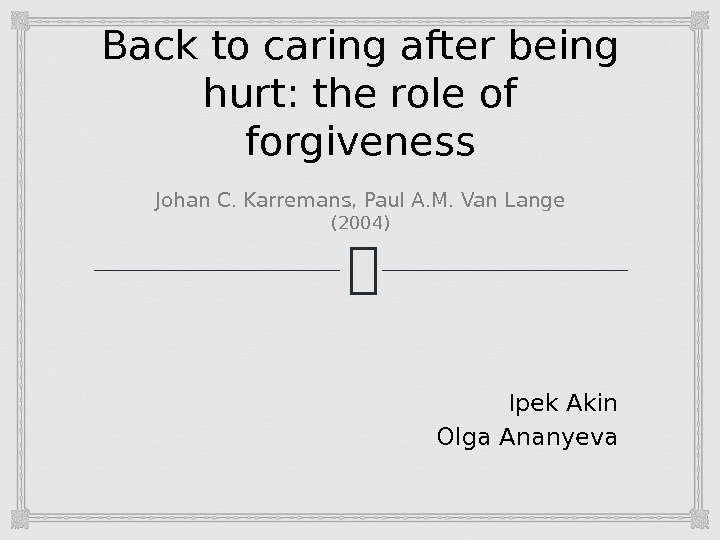
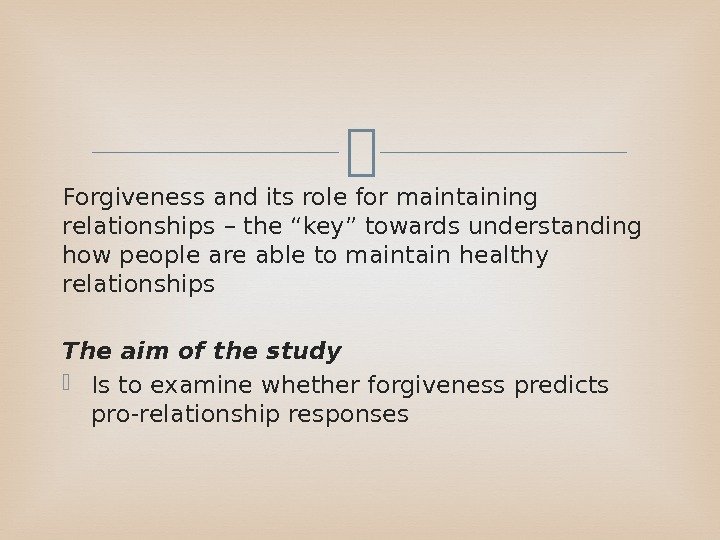
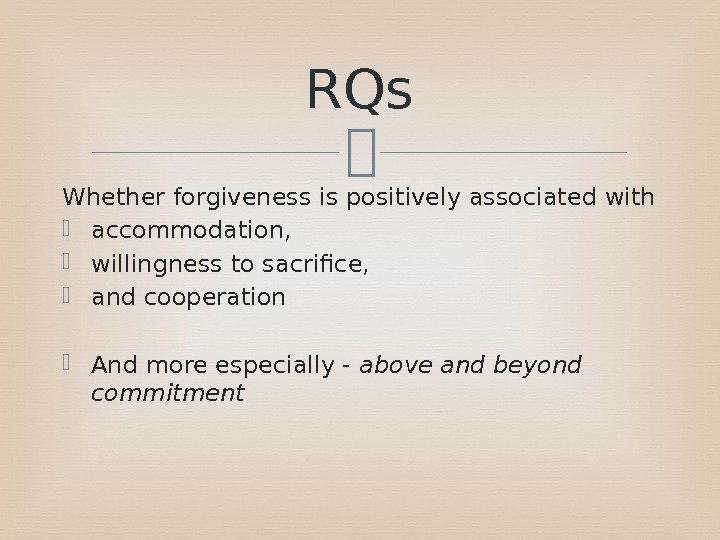
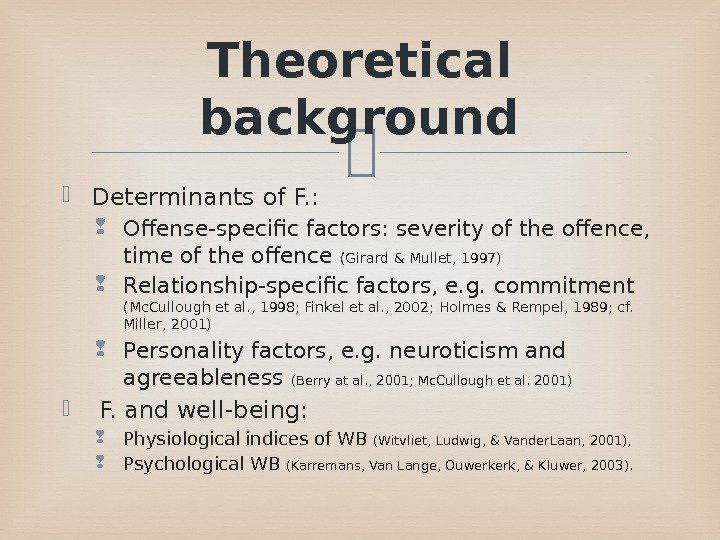
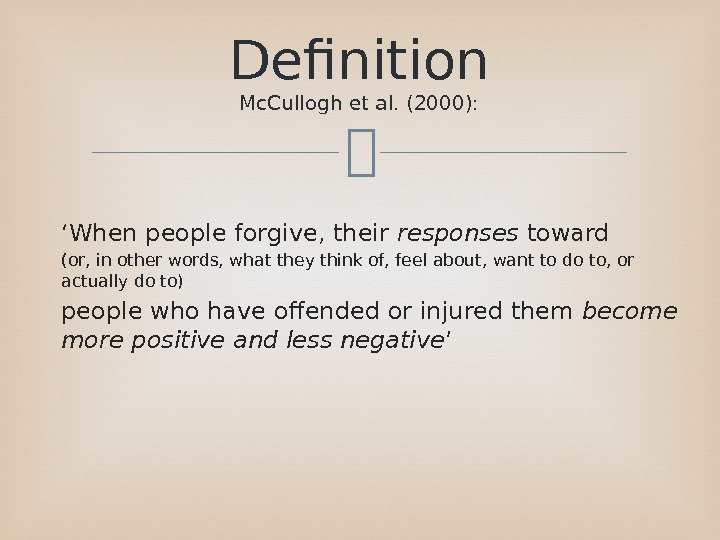
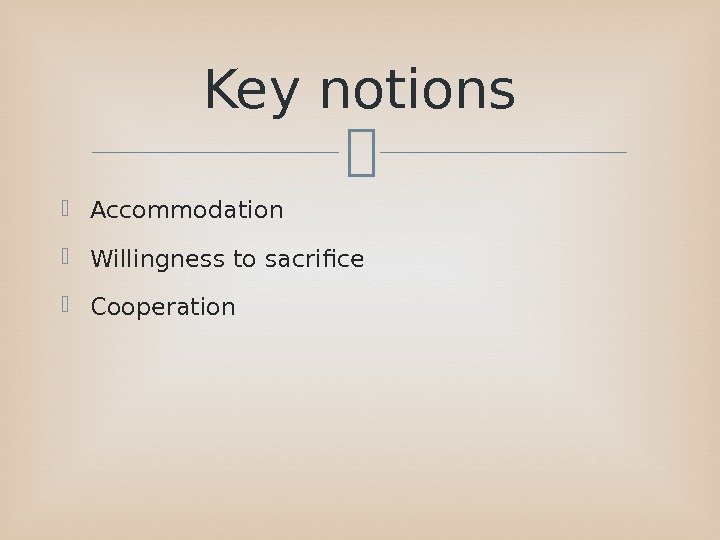
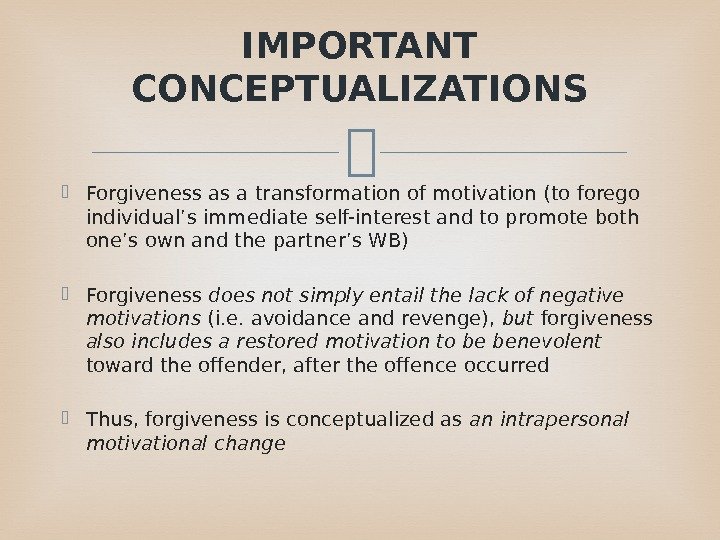
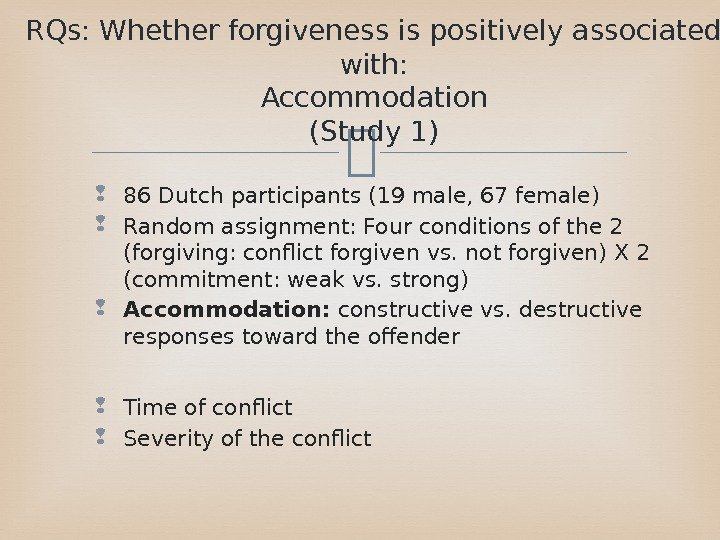
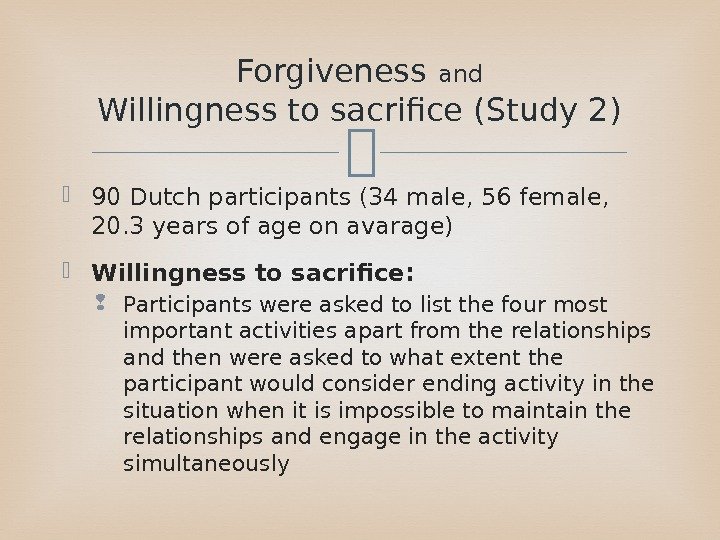
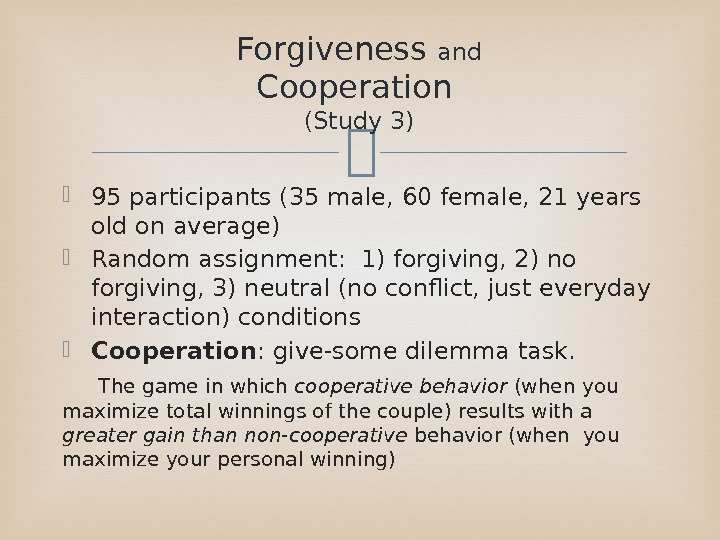
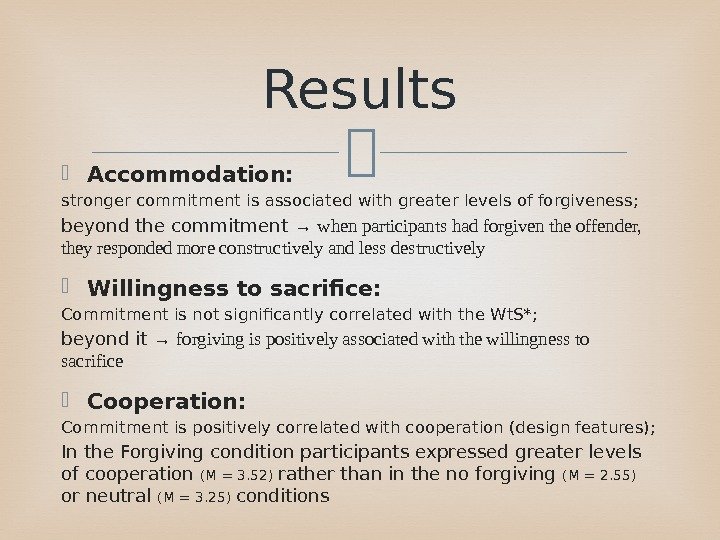
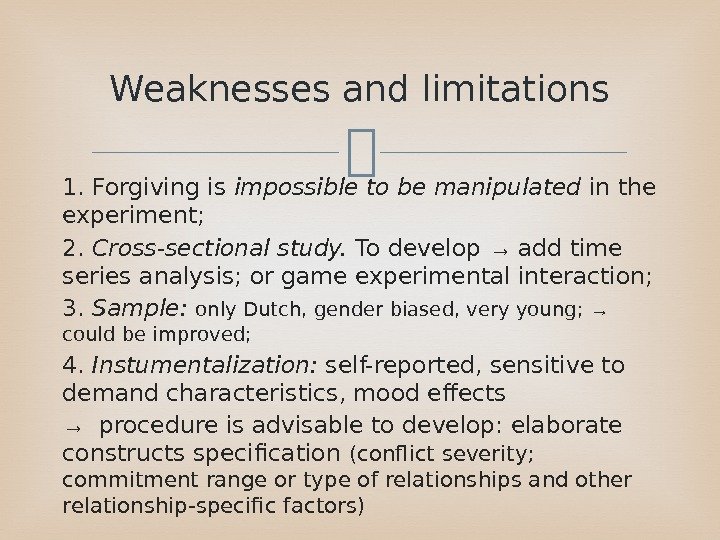
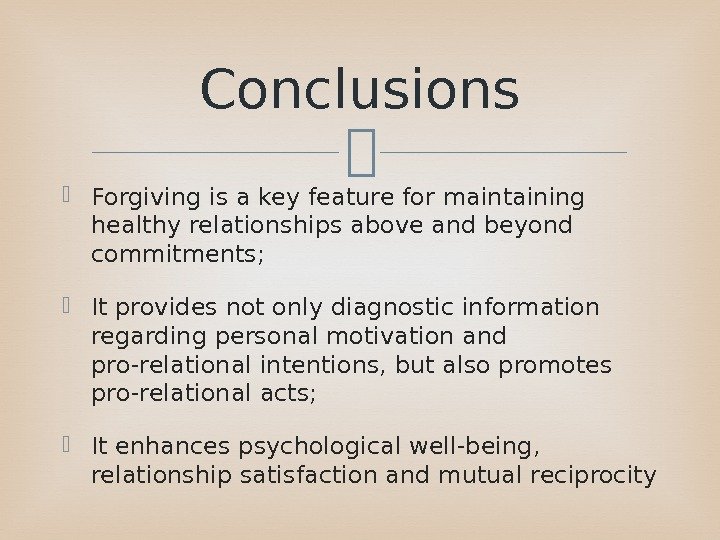
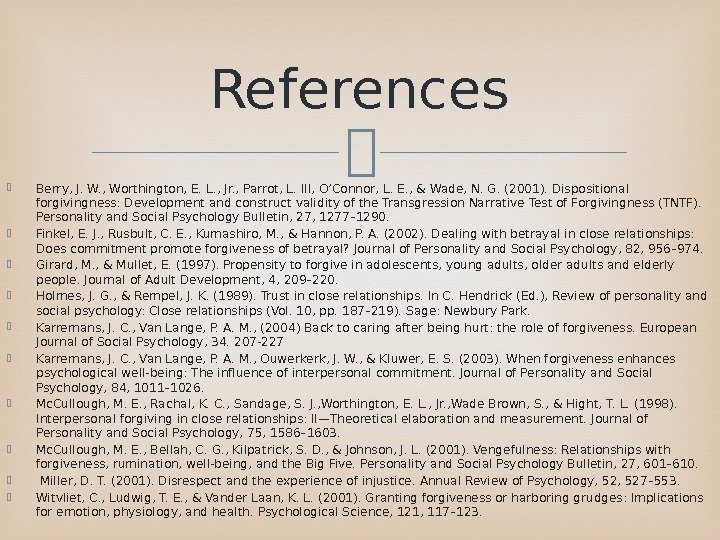
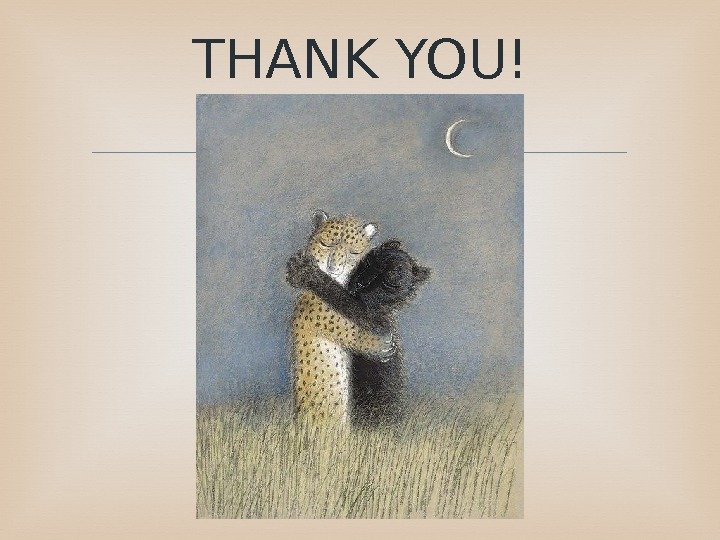
ib_presentation_final.pptx
- Размер: 879.0 Кб
- Автор:
- Количество слайдов: 15
Описание презентации Back to caring after being hurt: the role по слайдам
 Back to caring after being hurt: the role of forgiveness Johan C. Karremans, Paul A. M. Van Lange (2004) Ipek Akin Olga Ananyeva
Back to caring after being hurt: the role of forgiveness Johan C. Karremans, Paul A. M. Van Lange (2004) Ipek Akin Olga Ananyeva
 Forgiveness and its role for maintaining relationships – the “key” towards understanding how people are able to maintain healthy relationships The aim of the study Is to examine whether forgiveness predicts pro-relationship responses
Forgiveness and its role for maintaining relationships – the “key” towards understanding how people are able to maintain healthy relationships The aim of the study Is to examine whether forgiveness predicts pro-relationship responses
 Whether forgiveness is positively associated with accommodation, willingness to sacrifice, and cooperation And more especially — above and beyond commitment RQs
Whether forgiveness is positively associated with accommodation, willingness to sacrifice, and cooperation And more especially — above and beyond commitment RQs
 Determinants of F. : Offense-specific factors: severity of the offence, time of the offence (Girard & Mullet, 1997) Relationship-specific factors, e. g. commitment (Mc. Cullough et al. , 1998; Finkel et al. , 2002; Holmes & Rempel, 1989; cf. Miller, 2001) Personality factors, e. g. neuroticism and agreeableness (Berry at al. , 2001; Mc. Cullough et al. 2001) F. and well-being: Physiological indices of WB (Witvliet, Ludwig, & Vander. Laan, 2001), Psychological WB (Karremans, Van Lange, Ouwerkerk, & Kluwer, 2003). Theoretical background
Determinants of F. : Offense-specific factors: severity of the offence, time of the offence (Girard & Mullet, 1997) Relationship-specific factors, e. g. commitment (Mc. Cullough et al. , 1998; Finkel et al. , 2002; Holmes & Rempel, 1989; cf. Miller, 2001) Personality factors, e. g. neuroticism and agreeableness (Berry at al. , 2001; Mc. Cullough et al. 2001) F. and well-being: Physiological indices of WB (Witvliet, Ludwig, & Vander. Laan, 2001), Psychological WB (Karremans, Van Lange, Ouwerkerk, & Kluwer, 2003). Theoretical background
 ‘ When people forgive, their responses toward (or, in other words, what they think of, feel about, want to do to, or actually do to) people who have offended or injured them become more positive and less negative ’Definition Mc. Cullogh et al. (2000):
‘ When people forgive, their responses toward (or, in other words, what they think of, feel about, want to do to, or actually do to) people who have offended or injured them become more positive and less negative ’Definition Mc. Cullogh et al. (2000):
 Accommodation Willingness to sacrifice Cooperation Key notions
Accommodation Willingness to sacrifice Cooperation Key notions
 Forgiveness as a transformation of motivation (to forego individual’s immediate self-interest and to promote both one’s own and the partner’s WB) Forgiveness does not simply entail the lack of negative motivations (i. e. avoidance and revenge), but forgiveness also includes a restored motivation to be benevolent toward the offender, after the offence occurred Thus, forgiveness is conceptualized as an intrapersonal motivational change IMPORTANT CONCEPTUALIZATIONS
Forgiveness as a transformation of motivation (to forego individual’s immediate self-interest and to promote both one’s own and the partner’s WB) Forgiveness does not simply entail the lack of negative motivations (i. e. avoidance and revenge), but forgiveness also includes a restored motivation to be benevolent toward the offender, after the offence occurred Thus, forgiveness is conceptualized as an intrapersonal motivational change IMPORTANT CONCEPTUALIZATIONS
 86 Dutch participants (19 male, 67 female) Random assignment: Four conditions of the 2 (forgiving: conflict forgiven vs. not forgiven) X 2 (commitment: weak vs. strong) Accommodation: constructive vs. destructive responses toward the offender Time of conflict Severity of the conflict. RQs: Whether forgiveness is positively associated with: Accommodation (Study 1)
86 Dutch participants (19 male, 67 female) Random assignment: Four conditions of the 2 (forgiving: conflict forgiven vs. not forgiven) X 2 (commitment: weak vs. strong) Accommodation: constructive vs. destructive responses toward the offender Time of conflict Severity of the conflict. RQs: Whether forgiveness is positively associated with: Accommodation (Study 1)
 90 Dutch participants (34 male, 56 female, 20. 3 years of age on avarage) Willingness to sacrifice: Participants were asked to list the four most important activities apart from the relationships and then were asked to what extent the participant would consider ending activity in the situation when it is impossible to maintain the relationships and engage in the activity simultaneously Forgiveness and Willingness to sacrifice (Study 2)
90 Dutch participants (34 male, 56 female, 20. 3 years of age on avarage) Willingness to sacrifice: Participants were asked to list the four most important activities apart from the relationships and then were asked to what extent the participant would consider ending activity in the situation when it is impossible to maintain the relationships and engage in the activity simultaneously Forgiveness and Willingness to sacrifice (Study 2)
 95 participants (35 male, 60 female, 21 years old on average) Random assignment: 1) forgiving, 2) no forgiving, 3) neutral (no conflict, just everyday interaction) conditions Cooperation : give-some dilemma task. The game in which cooperative behavior (when you maximize total winnings of the couple) results with a greater gain than non-cooperative behavior (when you maximize your personal winning) Forgiveness and Cooperation (Study 3)
95 participants (35 male, 60 female, 21 years old on average) Random assignment: 1) forgiving, 2) no forgiving, 3) neutral (no conflict, just everyday interaction) conditions Cooperation : give-some dilemma task. The game in which cooperative behavior (when you maximize total winnings of the couple) results with a greater gain than non-cooperative behavior (when you maximize your personal winning) Forgiveness and Cooperation (Study 3)
 Accommodation: stronger commitment is associated with greater levels of forgiveness; beyond the commitment → when participants had forgiven the offender, they responded more constructively and less destructively Willingness to sacrifice: Commitment is not significantly correlated with the Wt. S*; beyond it → forgiving is positively associated with the willingness to sacrifice Cooperation: Commitment is positively correlated with cooperation (design features); In the Forgiving condition participants expressed greater levels of cooperation (M = 3. 52) rather than in the no forgiving (M = 2. 55) or neutral (M = 3. 25) conditions Results
Accommodation: stronger commitment is associated with greater levels of forgiveness; beyond the commitment → when participants had forgiven the offender, they responded more constructively and less destructively Willingness to sacrifice: Commitment is not significantly correlated with the Wt. S*; beyond it → forgiving is positively associated with the willingness to sacrifice Cooperation: Commitment is positively correlated with cooperation (design features); In the Forgiving condition participants expressed greater levels of cooperation (M = 3. 52) rather than in the no forgiving (M = 2. 55) or neutral (M = 3. 25) conditions Results
 1. Forgiving is impossible to be manipulated in the experiment; 2. Cross-sectional study. To develop → add time series analysis; or game experimental interaction; 3. Sample: only Dutch, gender biased, very young; → could be improved; 4. Instumentalization: self-reported, sensitive to demand characteristics, mood effects → procedure is advisable to develop: elaborate constructs specification (conflict severity; commitment range or type of relationships and other relationship-specific factors) Weaknesses and limitations
1. Forgiving is impossible to be manipulated in the experiment; 2. Cross-sectional study. To develop → add time series analysis; or game experimental interaction; 3. Sample: only Dutch, gender biased, very young; → could be improved; 4. Instumentalization: self-reported, sensitive to demand characteristics, mood effects → procedure is advisable to develop: elaborate constructs specification (conflict severity; commitment range or type of relationships and other relationship-specific factors) Weaknesses and limitations
 Forgiving is a key feature for maintaining healthy relationships above and beyond commitments; It provides not only diagnostic information regarding personal motivation and pro-relational intentions, but also promotes pro-relational acts; It enhances psychological well-being, relationship satisfaction and mutual reciprocity Conclusions
Forgiving is a key feature for maintaining healthy relationships above and beyond commitments; It provides not only diagnostic information regarding personal motivation and pro-relational intentions, but also promotes pro-relational acts; It enhances psychological well-being, relationship satisfaction and mutual reciprocity Conclusions
 Berry, J. W. , Worthington, E. L. , Jr. , Parrot, L. III, O’Connor, L. E. , & Wade, N. G. (2001). Dispositional forgivingness: Development and construct validity of the Transgression Narrative Test of Forgivingness (TNTF). Personality and Social Psychology Bulletin, 27, 1277– 1290. Finkel, E. J. , Rusbult, C. E. , Kumashiro, M. , & Hannon, P. A. (2002). Dealing with betrayal in close relationships: Does commitment promote forgiveness of betrayal? Journal of Personality and Social Psychology, 82, 956– 974. Girard, M. , & Mullet, E. (1997). Propensity to forgive in adolescents, young adults, older adults and elderly people. Journal of Adult Development, 4, 209– 220. Holmes, J. G. , & Rempel, J. K. (1989). Trust in close relationships. In C. Hendrick (Ed. ), Review of personality and social psychology: Close relationships (Vol. 10, pp. 187– 219). Sage: Newbury Park. Karremans, J. C. , Van Lange, P. A. M. , (2004) Back to caring after being hurt: the role of forgiveness. European Journal of Social Psychology, 34. 207 -227 Karremans, J. C. , Van Lange, P. A. M. , Ouwerkerk, J. W. , & Kluwer, E. S. (2003). When forgiveness enhances psychological well-being: The influence of interpersonal commitment. Journal of Personality and Social Psychology, 84, 1011– 1026. Mc. Cullough, M. E. , Rachal, K. C. , Sandage, S. J. , Worthington, E. L. , Jr. , Wade Brown, S. , & Hight, T. L. (1998). Interpersonal forgiving in close relationships: II—Theoretical elaboration and measurement. Journal of Personality and Social Psychology, 75, 1586– 1603. Mc. Cullough, M. E. , Bellah, C. G. , Kilpatrick, S. D. , & Johnson, J. L. (2001). Vengefulness: Relationships with forgiveness, rumination, well-being, and the Big Five. Personality and Social Psychology Bulletin, 27, 601– 610. Miller, D. T. (2001). Disrespect and the experience of injustice. Annual Review of Psychology, 527– 553. Witvliet, C. , Ludwig, T. E. , & Vander Laan, K. L. (2001). Granting forgiveness or harboring grudges: Implications for emotion, physiology, and health. Psychological Science, 121, 117– 123. References
Berry, J. W. , Worthington, E. L. , Jr. , Parrot, L. III, O’Connor, L. E. , & Wade, N. G. (2001). Dispositional forgivingness: Development and construct validity of the Transgression Narrative Test of Forgivingness (TNTF). Personality and Social Psychology Bulletin, 27, 1277– 1290. Finkel, E. J. , Rusbult, C. E. , Kumashiro, M. , & Hannon, P. A. (2002). Dealing with betrayal in close relationships: Does commitment promote forgiveness of betrayal? Journal of Personality and Social Psychology, 82, 956– 974. Girard, M. , & Mullet, E. (1997). Propensity to forgive in adolescents, young adults, older adults and elderly people. Journal of Adult Development, 4, 209– 220. Holmes, J. G. , & Rempel, J. K. (1989). Trust in close relationships. In C. Hendrick (Ed. ), Review of personality and social psychology: Close relationships (Vol. 10, pp. 187– 219). Sage: Newbury Park. Karremans, J. C. , Van Lange, P. A. M. , (2004) Back to caring after being hurt: the role of forgiveness. European Journal of Social Psychology, 34. 207 -227 Karremans, J. C. , Van Lange, P. A. M. , Ouwerkerk, J. W. , & Kluwer, E. S. (2003). When forgiveness enhances psychological well-being: The influence of interpersonal commitment. Journal of Personality and Social Psychology, 84, 1011– 1026. Mc. Cullough, M. E. , Rachal, K. C. , Sandage, S. J. , Worthington, E. L. , Jr. , Wade Brown, S. , & Hight, T. L. (1998). Interpersonal forgiving in close relationships: II—Theoretical elaboration and measurement. Journal of Personality and Social Psychology, 75, 1586– 1603. Mc. Cullough, M. E. , Bellah, C. G. , Kilpatrick, S. D. , & Johnson, J. L. (2001). Vengefulness: Relationships with forgiveness, rumination, well-being, and the Big Five. Personality and Social Psychology Bulletin, 27, 601– 610. Miller, D. T. (2001). Disrespect and the experience of injustice. Annual Review of Psychology, 527– 553. Witvliet, C. , Ludwig, T. E. , & Vander Laan, K. L. (2001). Granting forgiveness or harboring grudges: Implications for emotion, physiology, and health. Psychological Science, 121, 117– 123. References
 THANK YOU!
THANK YOU!
